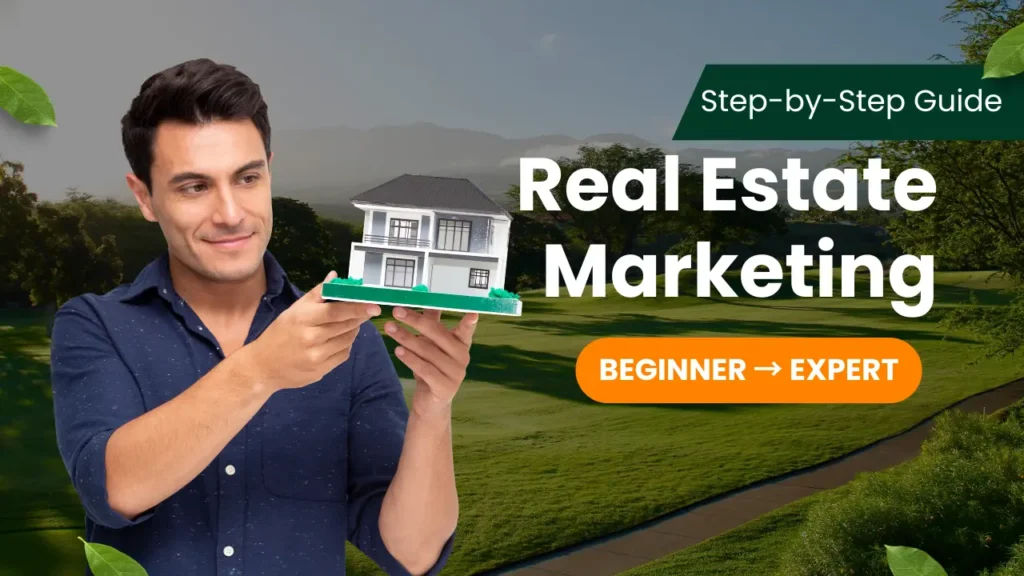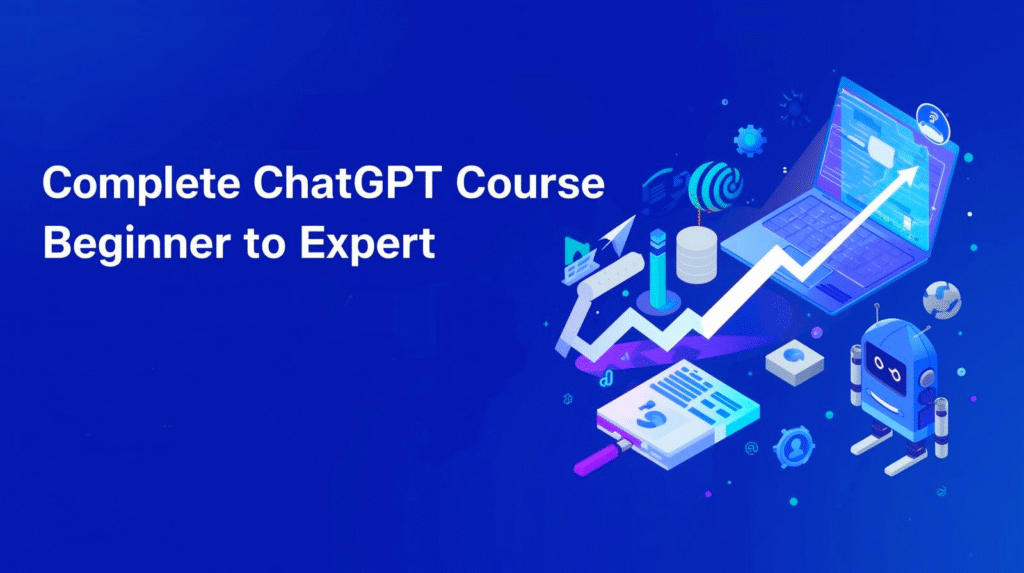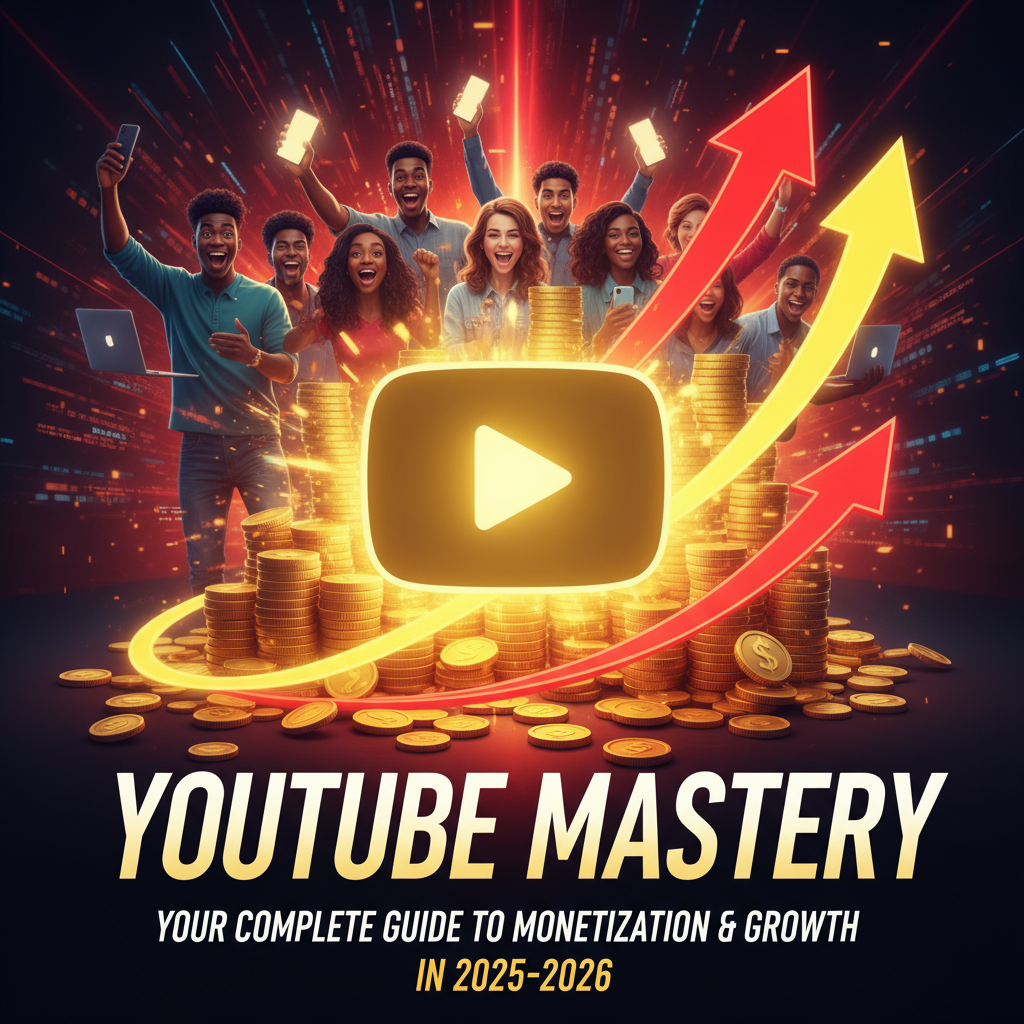Short summary: This comprehensive guide shows real estate professionals how to build a high-performing real estate marketing system — from listing optimization and local SEO to paid funnels, social media, lead nurturing, and running a real estate marketing agency. It covers digital and offline tactics, metrics to track, tools to use, and a growth blueprint you can implement immediately.

Index
- Why real estate marketing matters (overview)
- Definitions — real estate, realtor, real estate agent, real estate business
- Beginner: foundations every real estate professional must build
- Website & SEO for real estate digital marketing
- Content marketing, blogging & video (long-term organic growth)
- Local SEO & listings (Google Business Profile, directories)
- Social media strategy (Instagram, Facebook, LinkedIn, Pinterest, YouTube)
- Paid channels: Google Ads, Facebook/Meta Ads, Pinterest Ads, YouTube Ads
- Lead generation funnels & landing pages
- CRM, follow-up sequences and conversion optimization
- Reviews, reputation & referrals (the evergreen engine)
- Offline marketing that still converts (open houses, mailers, community)
- Analytics, attribution & KPI dashboard
- Hiring vs. outsourcing — building a real estate marketing agency
- Real estate digital marketing course & training recommendations
- Pricing, packaging & service offerings for an agency
- Advanced tactics & scaling to 7-figures
- Common mistakes to avoid
- 90-day action plan (beginner → intermediate → expert)
- Resources, checklist and final thoughts
1. Why real estate marketing matters (overview)
Real estate is a relationship business — but today those relationships begin online. Whether you are a solo real estate agent, a small real estate business, or running a real estate marketing agency, your ability to generate consistent, qualified leads digitally is the difference between feast and famine. Modern real estate marketing combines local search dominance, targeted paid advertising, and content that builds trust — all supported by a strong CRM and follow-up system.
2. Definitions — real estate, realtor, real estate agent, real estate business
- Real estate: property consisting of land and the buildings on it.
- Real estate agent / realtor: licensed professionals who represent buyers or sellers (Realtor is a trademarked term for members of the National Association of Realtors).
- Real estate business: can be an individual agent, a brokerage, property management, or developer.
- Real estate marketing: the set of tactics used to attract buyers, sellers, and investors—online and offline.
3. Beginner: foundations every real estate professional must build
Before any campaign, secure these foundations:
- Brand & positioning: define target neighborhoods, price bands, and client persona. Are you luxury, first-time buyers, rentals, or investment properties?
- Core assets: professional headshot, logo, USP (unique selling proposition), and 3–5 content pillars (e.g., market updates, listings, home staging tips).
- Website (non-negotiable): mobile-first, fast, IDX/MLS integration if possible, clear CTAs (schedule tour, valuation), easy contact forms.
- Google Business Profile: claim and optimize for your office and key agents. Add photos, regular posts, and solicit reviews.
- CRM: choose a CRM (HubSpot, LionDesk, Follow Up Boss, Zoho CRM) and map basic pipelines (new lead → nurture → appointment → close).
- Legal & compliance: lead capture disclaimers, email opt-in consents, advertising compliance for your region.
4. Website & SEO for real estate digital marketing
Your website is your lead hub. Optimization includes:
- Technical SEO: fast hosting, HTTPS, mobile responsive, structured data (schema for LocalBusiness and RealEstateAgent), XML sitemap.
- Keyword strategy: combine high-intent queries (e.g., “buy 2BHK in [neighborhood]”, “houses for sale near [school]”) with long-tail local terms. Use pages for each neighborhood and property type.
- On-page SEO: title tags, meta descriptions, headers, rich descriptions for listings, and internal linking to blog posts and neighborhood guides.
- IDX/MLS integration: provides live listings; use it to keep content fresh and capture searches.
- Blog & resources: publish market reports, buyer guides, financing explainers, and case studies to attract organic traffic.
- Conversion optimizations: sticky lead forms, exit popups for valuations, and click-to-call buttons for mobile.
5. Content marketing, blogging & video (long-term organic growth)
Content builds trust and drives repeat traffic.
- Blog topics: “Best neighborhoods for families in [city]”, “How to price your home to sell fast”, local school guides.
- Video: neighborhood walk-throughs, listing walkthroughs, client testimonial videos, “market update” shorts. YouTube and short-form Reels/Shorts work well.
- Email newsletters: monthly market snapshot and hot listing alerts.
- Repurposing: turn a single market report into a blog post, a short video, social carousels, and an email — multiply reach with minimal extra work.
6. Local SEO & listings (Google Business Profile, directories)
Local dominates real estate.
- Claim Google Business Profile for each office and optimize categories, photos, services, hours.
- Continuously collect reviews and reply to them. High review count + keywords in reviews = local rankings boost.
- Listings on Zillow, Realtor.com, Trulia, and local portals — keep NAP consistent.
- Build local backlinks: sponsorships, local news features, neighborhood guides, and partnerships.
7. Social media strategy (Instagram, Facebook, LinkedIn, Pinterest, YouTube)
- Instagram: visual showrooms — Reels for quick walk-throughs, carousels for tips, Stories for behind the scenes. Use location tags and hashtags.
- Facebook: paid lead ads, community groups, events (open houses), Marketplace for listings.
- LinkedIn: thought leadership for commercial real estate or investor audiences.
- Pinterest: great for home staging, renovation pins that drive long-term traffic.
- YouTube: long-form neighborhood tours and market explainer videos that rank on Google.
8. Paid channels: Google Ads, Facebook/Meta Ads, Pinterest Ads, YouTube Ads
Paid ads accelerate leads:
- Google Search Ads: target high-intent queries: “homes for sale in [neighborhood]”, “sell my home in [city]”. Use location bid adjustments and Sitelink extensions.
- Display & Remarketing: retarget site visitors with listing carousels.
- Facebook/Meta Ads: lead ads, Messenger automation, dynamic ads for listings (catalog integration).
- YouTube Ads: use video discovery and in-stream for brand awareness; retarget viewers with lead magnets.
- Pinterest Ads: promote pins for renovation content and capture home-improvement intenders.
- Budgeting & LTV model: estimate customer lifetime value (commission × transactions/year) to back into CPA targets.
9. Lead generation funnels & landing pages
High-converting funnels include:
- Top of funnel (TOF): free guides, neighborhood reports, or market insights in exchange for email.
- Middle (MOF): drip email sequences, value videos, and buyer/seller checklists.
- Bottom (BOF): book a showing CTA, instant valuation tools, mortgage pre-approval scheduling.
- Landing pages: single-purpose, ultra-fast, and mobile optimized — no navigation, clear social proof, and a single CTA.
Use UTM tagging to attribute channels and test variations with A/B testing.
10. CRM, follow-up sequences and conversion optimization
- Lead routing: immediate SMS and email to the assigned agent + task in CRM. Speed matters — 5 minutes is a crucial window.
- Drip campaigns: nurture buyers with staggered content: market updates → financing tips → listings.
- SLA & KPIs: response time, appointments booked, showings completed, conversion from lead→client.
- Dialers & automation: integrate outbound dialers, voicemail drops, and chatbots for 24/7 capture.
11. Reviews, reputation & referrals (the evergreen engine)
- Ask for reviews after every closing with a template and direct review links (Google, Zillow).
- Referral program: provide referral incentives for past clients and local partners.
- Case studies & testimonials: use video and written stories across site and socials.
12. Offline marketing that still converts (open houses, mailers, community)
- Open houses: advertise via Facebook Events + local hyperlocal targeting. Capture emails at entry.
- Direct mail: targeted postcards to neighborhoods with recent sales data — combine with a digital landing page.
- Community sponsorships: local events, charity partnerships, and school sponsorships build trust and backlinks.
13. Analytics, attribution & KPI dashboard
Track the right metrics:
- Traffic & SEO: organic sessions, top landing pages, queries.
- Lead metrics: leads per channel, CPL (cost per lead), response time, SQLs (sales qualified leads).
- Conversion: contact rate → appointment rate → close rate.
- Revenue: deals closed, AOV (average deal size), LTV.
Use Google Analytics 4, Facebook Ads UI, CRM reports, and a BI dashboard (Data Studio/Tableau) to combine data sources.
14. Hiring vs. outsourcing — building a real estate marketing agency
If scaling beyond two agents, consider hiring or partnering with a real estate digital marketing agency. Typical roles:
- In-house: marketer, content creator, ads specialist, listing coordinator, CRM admin.
- Outsource: PPC agency, SEO specialist, videographer, virtual assistant.
- If you want to start a real estate marketing agency, package services: local SEO, paid ads, social management, listing photography, and IDX setup.
15. Real estate digital marketing course & training recommendations
For agents and agencies, invest in a course that covers local SEO, paid campaigns, content systems, and CRM automation. Look for courses with practical templates, ad examples, and mentorship. (Search for up-to-date courses from reputable marketers and platform partners like Google, Meta, and local MLS education).
16. Pricing, packaging & service offerings for an agency
Common agency models:
- Monthly retainer: ongoing SEO, content, and ad management.
- Performance-based: percentage of deals or cost per lead targets.
- Project-based: website build, IDX integration, launch package for new brokers.
- Hybrid: setup fee + lower retainer + performance bonus.
Set clear deliverables, SLAs and reporting cadence.
17. Advanced tactics & scaling to 7-figures
- Data-driven territory expansion: use CRM and CRM analytics to ID high-ROI ZIP codes.
- SOPs & playbooks: repeatable systems for listing launches, open house campaigns, and ad creatives.
- Tech stack: integrate Zapier/Make, advanced bidding via scripts, dynamic ads and programmatic retargeting.
- Franchise model: license your marketing system to other agents or markets.
18. Common mistakes to avoid
- Chasing vanity metrics over qualified leads.
- No follow-up automation — losing leads in inboxes.
- Weak listing photos and poor staging.
- Ignoring local SEO and reviews.
- Using broad targeting without proper geo-fencing or intent signals.
19. 90-Day Action Plan (Beginner → Intermediate → Expert)
Days 0–30 (Foundation)
- Define target neighborhoods & client persona.
- Build or audit website + Google Business Profile.
- Launch 1 lead magnet + 1 landing page.
- Start basic FB/Meta lead ad with $20/day.
Days 31–60 (Momentum)
- Implement IDX / listing feed.
- Publish 4 neighborhood blog posts + 8 social posts.
- Set up CRM and lead routing.
- Start Google Search Ads for high-intent keywords.
Days 61–90 (Scale)
- Optimize ad funnels, scale top performers.
- Launch video content series on YouTube/Instagram Reels.
- Run a hyperlocal direct mail + retargeting combo.
- Implement referral program and request 10 reviews.
20. Resources, checklist and final thoughts
Quick checklist
- Claim Google Business Profile
- Launch a mobile-first website with IDX
- Install tracking pixels and GA4
- Set up lead magnets & landing pages
- Implement CRM with lead routing
- Start paid ads and measure CPA
- Build content calendar (video + blog)
- Create review & referral system
Final thoughts
Real estate marketing combines trust, visibility, and speed. Agents who win are those who marry local expertise with digital systems. If you’re a realtor or thinking about starting a real estate marketing agency, focus on repeatable processes, a measurable ad strategy, and exceptional client service.
Focus Keywords:
- real estate marketing agency
- real estate marketing
- real estate digital marketing
- real digital marketing
- real estate
- real estate agent
- real estate business
- realtor
- real estate digital marketing course
- real estate digital marketing agency









